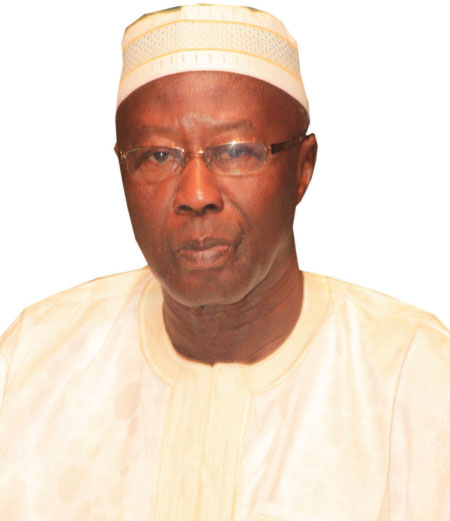
The Minister of Local Government and Lands, Hon. Lamin Waa Juwara, has reacted to the statement issued by the Gambia Moral Congress (GMC) party over a purported land mortgage by the
In an interview with this reporter yesterday, Minister Juwara said: “As of now, Government have not sold or mortgaged any land to any individual or group of individuals, more so Bangladeshi in the Central River Region.”
In a statement sent to the media last week, the Gambia Moral Congress said reports in various media have it that the
“We want the GMC leader to tell us which media reported this case, since they are totally unfounded,” the lands minister said.
According to him, way back in 2010, the government got a request from a group of Bangladeshi investors through the Gambia Investment and Export Promotion Agency, GIEPA, expressing interest in certain areas such as in LRR, URR, and CRR north and CRR south to be used for agricultural purposes.
To that effect, he added, the government set up a taskforce which comprised the ministries of Local Government and Lands, Fisheries and Water Resources, as well as GIEPA, National Agricultural Research Institute, department of Physical Planning and Housing and department of Lands and Survey, and the National Environment Agency (NEA) to look into the matter.
“The situation as of now is stalled. There is no formal agreement between the government and Bangladesh, which proves that there has never been any land sold or mortgaged between us and them,” Juwara clarified.
He said the areas identified are provincial lands, which are administered by the Provincial Lands Act which empowered local authorities to allocate such lands, and not central government directly.
“The position of the government is that it is committed to the utility and usage of our limited land resources, and to protect it in the interest of the Gambian people,” he said.
“I think the moral standing of the government is very clear, when it comes to development. We are not anti-investors, we encourage investors,” Minister Juwara argued.
The minister for Local Government and Lands argued that the GMC leader has no proof of a political constituency in the country.
“We don’t need any moral lecture from GMC leader Mai Fatty,” said the minister.
He added: “I think the GMC leader have appeared cynical when he himself have no track record of being the champion of the interest of the Gambian people.”
He concluded by saying that the approval rating of the Gambia government has been manifested during the recent National Assembly and Presidential elections.
Meanwhile, below is the full text of the GMC statement:
GMC Wants Clarifications
In a government where transparency reigns, rumours would have no place to hide. An informed citizenry is the best assurance against misinformation, supposition and conjecture in matters of public policy. Governments exist as servants of the people and not their Masters. A servant remains at the beck and call of its Master.
In The Gambia, this is codified into law – The Gambia Government derives its authority from the consent of the governed. One of the implications of this constitutional principle means that whatever government conducts for and on behalf of the citizenry, must be fundamentally in their exclusive interest.
In the same spirit, government must be transparent in its conduct, which requires that citizens be consulted and informed at all times of policies and their implications. These include international treaties, bilateral protocols or multilateral conventions.
Parliament, in a democracy has the constitutional role to subject the Executive to task, and opposition parties equally have the duty to hold government accountable. Civil society’s role is indispensable in this process.
The State does not exist for those who work in government or design and implement policies or laws. Those are servants of the State, from the highest paid to the lowest paid public employee. The conduct of the State should not be shrouded in perpetual secrecy.
Invariably, certain matters bordering on public security as defined in our laws may be exempt, in so far as they may be inimical to sovereign stability, public order or peace. Agreements with private businesses should not be conducted in secrecy. The Gambia is full of rumour mills. This is avoidable.
Transparency is the cardinal principle of democratic governance, and those who wield authority are enjoined to practice it. A free press is the bastion of transparency, without which even the press itself may become an unwitting vector of rumour mongering. That is why I support press freedom and also advocate for the legislation of Freedom of Information Act in The Gambia.
Reports in various media have it that the Gambia Government has mortgaged or sold substantial parcels of land in the CRR to Bangladeshi mercantilists for agricultural purposes, for export to Bangladesh.
GMC requests clarification from government. If indeed these reports are true, I urge the Government to render the details clear without delay.
Every inch of Gambian soil belongs to Gambians and can be redeemed at any material time. Persons and governments may come and go, but the Gambian State shall remain. What one government may put into operation could be taken out of operation by another government. No regime is eternal.
For us at GMC, the use, protection and preservation of State lands and other natural endowments for Gambians yet unborn is a fundamental national security interest. Our land area shall not increase, while our population continues to explode.
Our increasing demand for food security is at crises point, and the protection of our flora and fauna must be taken seriously. For a very small country like The Gambia, with a rising young population, these are matters of grave concern to me.
We have the superior obligation of protecting The Gambia’s future. We urge the Government to clarify the Bangladeshi land deal and put rumours to rest.
Dated the 12th day of May 2012.
Mai Ahmad Fatty,
GMC Party Leader
Read Other Articles In Article (Archive)
Armed Forces Set For African Military Championship
Nov 21, 2008, 4:50 AM

Brufut Utd whip Kexx Utd to keep 1st division promotion aspirations alive
Feb 9, 2017, 12:01 PM


